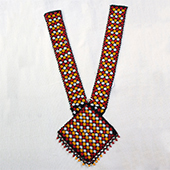Bead weaving is a technique of beadwork in which seed beads are the primary material that is used. The technique of bead weaving is used to weave seed beads together onto a plane fabric or to make three-dimensional objects like a ball, box, clasp, etc. They are also used for making a flower, stringing to fill up space between other beads in jewellery and also to make new jewellery from beads. They are generally used in embroidery and also expended for loom and off-loom bead weaving techniques like brick stitch and peyote stitch. These beads are very small yet uniformly shaped that are available in innumerable shapes, colors, sizes, and textures. Most commonly seed beads are prepared using glass.
The history of beads dates back to the Late Old Stone Age (the Upper Paleolithic). But during those days beads were large in size probably made of ivory or shells. The seed beads which are presently used for bead weaving are also an ancient art that can be traced back to Egyptian items dating back to 4000 years. One of the best examples of those days for beadwork was King Tut of ancient Egypt had beadwork in his tomb and other examples tend to be rare. But there were several beaded items found in the Shosoin temple in Nara, Japan dating to the 8th century A.D.
Beadwork in India also noted around the 9th century B.C. refers to the braiding of beads into horsetails and hairs. The very first reference that speaks evidently about bead weaving is about 1300 A.D. And the earliest mass-produced seed beads were noted to be the Indo-Pacific beads of India and associated regions. They led the bead trade for about 2000 years. Around 1490 the Modern era of beadwork began when Venice learned to turn round tubes into round seed beads. Thus the creation, development and production of seed beads were traditionally pioneered by the European glassmaking centre of Murano in Italy. Later the technique reached Bohemia, France, and Germany. In France faceted metal seed beads were renowned.
It is always considered that the ability to manufacture seed beads in bulk is one of the major developments in the history of beads. It was appreciated to produce seed beads in mass from a tube of glass rather than the earlier laborious practice of generating individual beads. Further in 1860s bead-making industry saw development in the making of beads as several new processes and machines were introduced which machines enabled the glassworks to add uniformity of color and sizing. Then in the early 20th century mass production of beads arrived when the machines could draw glass tubes automatically and generate even greater consistency in the size of beads. Moving on to the present day, the process of manufacturing beads still possesses many historic procedures involved in the production of seed beads. It is also very interesting to witness the 24-hour operation of making seed beads.
Today bead weaving is a strong living tradition practised by both men and women in India. Sitaben Chawda from Gujarat is one such experienced artisan in bead weaving industry. She has experience of 35 years in this trade. After pursuing the eleventh standard instead of continuing her further education she involved herself in the work of embroidery making. Later as she was interested in making decorative items and dolls made of plastic beads, after a while of working on these products she was further inspired to make small-small bead items out of which she created key chains and other house decorative items. Initially, she sold these bead items through Major Mahajan Khadi Sewa Board with which her father was in contact. This helped the artisan to get the contact of Gurjari handicraft of Gujarat, for which she worked on bead weaving for about 15 years continuously.
The articles/jewellery made of seed beads are famous among the Saurashtrian community of Gujarat. These bead articles were majorly used for decorating Saurashtra's Darbar halls and Rajput houses. As the artisan belongs to Saurashtrian society, she is much aware of the value of bead weaving in their community. As per the information given by the artisan these seed bead jewelries are famous among Rajputs and worn by the Varjara people of Gujarat and tribal people located near Nal Sarovar.
Sitaben was trained under the guidance of Mr. Mirza and Mr. Carvin Fernandez. After becoming a professional bead weaver she held numerous workshops on bead weaving. She also conducted a workshop at the National Institute of Design through which her art was recognized by NRIs and localities as well. She also got an opportunity to sell her bead articles in Kuldeep Nagar. One of the other major workshops that were held by the artisan was in Uttarakhand for fifteen days and a camp in Delhi. Artisan happily says that students from National Institute of Design, National Institute of Fashion Technology and NRI are more fascinated and are interested to learn bead weaving among all her students in workshops. Last but not least the artisan conveys the credit of this bead weaving business success to her father, as it was his dream to attract Non-Resident Indians (NRIs) towards their art.







